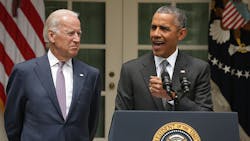WASHINGTON, D.C. — The Supreme Court upheld a disputed portion of President Barack Obama’s landmark health care reform on Thursday in a major legacy-building victory for his administration.
By a margin of 6-3, the judges ruled in favor of allowing the federal government to subsidize health insurance by giving tax credits to consumers nationwide.
A triumphant Obama quickly hailed the ruling, calling it a win for “hard-working Americans all across this country. … This law is working, and it’s going to keep doing just that.”
Opponents of the Affordable Care Act — better known as Obamacare — had argued that it was unconstitutional for the federal government to subsidize insurance in this way in states that refused to set up their own insurance exchanges.
The narrow question before the court was whether some 7 million people who signed up for Obamacare via the government’s website were actually entitled to tax subsidies that make the coverage affordable.
But the high court ruled that the law should stand, with two usually conservative justices joining the four generally liberal members of the panel to overturn the challenge.
In a ruling read out by Chief Justice John Roberts, the bench argued that it was clear that the original law had been intended to permit federal subsidies in all states. Failure to do so would have condemned the law to a “death spiral” by destabilizing the insurance market in states with federally run exchanges, Justice Sonia Sotomayor had said in March when the case was heard.
“It thus stands to reason that Congress meant for those provisions to apply in every state as well ... tax credits are available to individuals in States that have a federal exchange,” the ruling said.
Republicans have mounted several legislative attacks on the law in parallel to the legal assaults and this is the second time in three years that the court has saved it.
The remaining three conservative judges opposed the ruling in a minority opinion presented by Justice Antonin Scalia that argued his colleagues had twisted the language of the bill in order to save it.
“Today’s opinion changes the usual rules of statutory interpretation for the sake of the Affordable Care Act,” Scalia wrote. ”We should start calling this law SCOTUScare,” he added, using the acronym for the Supreme Court.
For Obama, the ruling marked a major victory that cements his signature domestic policy achievement.
“Five years in, this is no longer about a law. This is not about the Affordable Care Act as legislation or Obamacare as a political football. This is health care in America,” the president said in the White House Rose Garden.
Reaction from both sides of the aisle
Fellow Democratic lawmakers hailed the announcement.
“This is a victory for common sense and for all American families,” said Nancy Pelosi, leader of the Democratic minority in the House of Representatives. “It is long past time for Republicans to abandon their assault on the newfound health security that the Affordable Care Act is providing millions and millions of Americans across the country.”
Republicans reacted angrily.
“Republicans will continue to fight tooth and nail to repeal this oppressive law,” said Senator John Cornyn, the party’s No. 2 leader in the senate. “Today’s decision doesn’t change the fact that Obamacare has been a disaster for the millions of hardworking American families who have seen their health care costs skyrocket or lost their insurance entirely.”
Several Republican contenders in the 2016 presidential race to succeed Obama also slammed the ruling.
“Despite the court’s decision, Obamacare is still a bad law that is having a negative impact on our country and on millions of Americans,” Senator Marco Rubio said. “I remain committed to repealing this bad law.”
Another White House hopeful, Jeb Bush, called it a “fatally flawed law” and added: “This decision is not the end of the fight against Obamacare.”
Democratic presidential candidate Hillary Clinton tweeted: “Yes! SCOTUS affirms what we know is true in our hearts & under the law: Health insurance should be affordable & available to all.”
Copyright Agence France-Presse, 2015
About the Author
Agence France-Presse
Copyright Agence France-Presse, 2002-2025. AFP text, photos, graphics and logos shall not be reproduced, published, broadcast, rewritten for broadcast or publication or redistributed directly or indirectly in any medium. AFP shall not be held liable for any delays, inaccuracies, errors or omissions in any AFP content, or for any actions taken in consequence.
